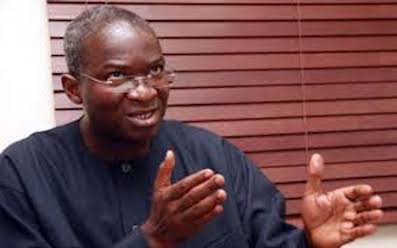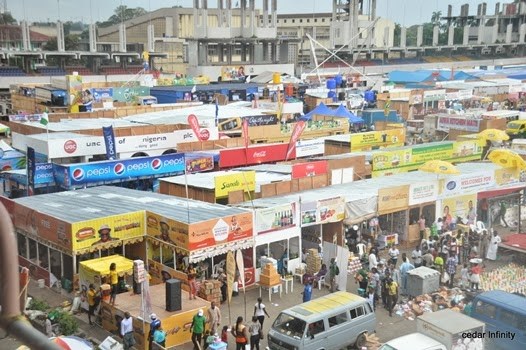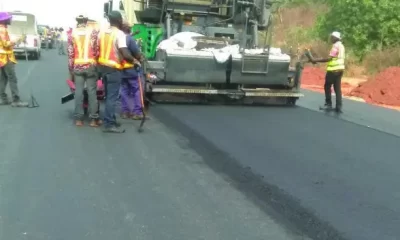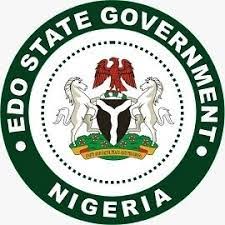Economy
Why Poor State of Roads Persists Nationwide -Fashola

By Mathew Dadiya, Abuja
The Mjnister of Works and Housing, Babatunde Fashola has attributed the inability of Federal Government to address dilapidated roads across the country to none release of budgetary funds by the ministry of finance.
Fashola explained that most contracts failed due to under budgeting and poor funding.
Speaking to State House correspondents after the Federal Executive Council (FEC) meeting chaired by President Muhammadu Buhari on Wednesday, he lamented that no dime has been released to his Ministry from the 2019 budget.
He lamented that his ministry hardly accessed adequate funding to perform its statutory mandate hence the littering of uncompleted and abandoned projects across the country.
The mjnister’s explanation came amidst claims by the National Assembly, that about 20,000 abandoned projects litter the country.
Debunking the allegation Fashola recalled that when the Buhari administration came into power in 2015, it concentrated on completing all abandoned projects rather than initiating new ones so as not to forestall development, adding that only N18billion was allocated for works in 2015 budget.
He said that the decision has seen the government making efforts to complete ongoing road contracts left behind by its predecessors despite budgetary constraints.
Fashola said while the public misconstrued the challenges, the progress that has been made seems delayed because some of the projects including newly initiated ones suffered set back due to lack of community support, over-blotted compensation sums submitted by the public and lean budgetary provisions which, most times were not even accessible.
He said that despite these constraints, government never felt deterred, it has been reviewing cost of on-ongoing and abandoned projects to make them viable for completion.
“Today, two of the approvals were to revise the estimates of cost to enable contractors continue work.
“Council approved N519 million revision of contract of Oba – Nnewi – Okigwe Road to cater for change in cost of materials since the project was awarded in 2009. The contract sum revised from N3.7billion to N4.3 billion.
“The second contract that had a revision of estimated cost, is the 67 kilometers Alace-Ugep road in Cross River state, Council approved a revision from N9.16 billion to 11.22 billion, the revised cost is N2.052 billion.
“Council approved the change of contractor for the Chachangi bridge linking Takum and Wukari in Taraba State and re-awarded it at the cost of N2.132 billion.
“Katsina-Ala bridge was also approved at the cost of N3.576 billion, which include total bridge repairs, changing of expansion joints, changing of bearings and rehabilitation of the 3.2 kilometers access road at Ugbema junction in Benue State,” the Minister explained.
The minister further disclosed that despite the increased budgetary provision for the ministry of works from N18 billion in 2015 to about N300bn in 2016, 2017, 2018 and 2019, ”we still can’t find the money to implement the projects, we need community support as well.”
He also lamented that the ministry wasc faced with a challenge of over N10 billion compensation for the second Niger bridge.
”There is a very clear distinction doing a project that is uncompleted and a project that is abandoned. They mean two different things. If you ask me you say there is a report about 20000 abandoned projects, my ministry doesn’t have 20000 projects.
”One of the things we have done including what we have done today finding out why projects have not been completed in some cases the rates have become obsolete so the price of cement has changed, the exchange rate has changed, inflation has gone into the quantities in which it was awarded before we came. So we are trying to resuscitate some of those projects because we know that the contractors will not go back to work if the pricing is not right, that is one thing we are doing.
”It is the government policy to ensure that we complete as many projects as possible. Unlike in the past, this government has focused on completing projects.
”In addition to that, we have increased the budget size so the budget size for all of the Nigerian roads in 2015 was N18 billion. So those are accumulations that we now have to manage and overcome was as a result of under budgeting and under funding.
”Now there is a distinction, we have increased the budget to roughly about N300 billion but we still can’t fund the N300 billion.
”So when we get the approval that is the one half of the story, the other half of the story is that we don’t get all of the cash. So your investigation must include how much is being released against how much is being approved in the budget
”There is yet another problem, the local communities, we are having problems there too. We have problem I think in Sapele-Ewu road, youths, community, compensation issues. Immediately we mobilize to site, people build all sorts of things within the right of way and file all sorts of claims for compensation.
”When you look at how much you have to pay for compensation and how much you have to spend on the roads you begin to do your maths very carefully. So we need community support as well.
”People who want infrastructure must also reasonably be willing to sacrifice. The amount we are facing now in claims in compensation for Second Niger Bridge is already in excess of N10 billion, just for compensation for land and all of that.
”Now you hear the Minister of Finance, you hear everybody saying we need to raise money to fund infrastructure; there is a gap between our infrastructure needs, our commitments to respond and our income. So we have to fund a deficit.
On one hand there is another side of the debate that is saying the country is borrowing too much so these are the challenges.”
Economy
Customs Zone D Seizes Contraband Worth N110m

The Nigeria Customs Service (NCS), Federal Operation Unit (FOU), Zone D, has seized smuggled goods worth over N110 million between April 20 till date.
The Comptroller of Customs, Abubakar Umar, said this at a news conference on Tuesday in Bauchi.
He listed the seized items to include 11,200 litres of petrol; 192 bales of second hand clothing, 140 cartons of pasta, 125 pairs of jungle boots, 47 bags of foreign parboiled rice and 9.
40 kilogramme of pangolin scales.Umar said the items were seized through increased patrols, intelligence-led operations, and strengthened inter-agency collaboration.
The comptroller said the pangolin scales would be handed over to the National Environmental Standards and Regulations Enforcement Agency (NESREA) for appropriate action, while the seized petrol would be auctioned, and the proceeds remitted to the federation account.
He attributed the decrease in smuggling activities of wildlife, narcotics, and fuel to the dedication and professionalism displayed by the personnel in line with Sections 226 and 245 of the NCS Act 2023.
The comptroller enjoined traders to remain law abiding, adding the service would scale up sensitisation activities to combat smuggling.
“We remain resolute in securing the borders and contributing to Nigeria’s economic development,” he said.
The FOU Zone D comprises Adamawa; Taraba, Bauchi, Gombe, Borno, Yobe, Plateau, Benue and Nasarawa. (NAN)
Economy
Trade Tensions: Global Economy Stands at Fragile Turning Point -UN

The UN Department of Economic and Social Affairs (UN DESA) has said that the global economy stands at a fragile turning point amid escalating trade tensions and growing policy uncertainties.UN DESA, in a report published on Thursday, stated that tariff-driven price pressures were adding to inflation risks, leaving trade-dependent economies particularly vulnerable.
It stated that higher tariffs and shifting trade policies were threatening to disrupt global supply chains, raise production costs, and delay key investment decisions – all of this weakening the prospects for global growth. The economic slowdown is widespread, affecting both developed and developing economies around the world, according to the report.For instance, in the United States, growth is projected to slow “significantly”, as higher tariffs and policy uncertainty are expected to weigh on private investment and consumer spending.Several major developing economies, including Brazil and Mexico, are also experiencing downward revisions in their growth forecasts.China’s economy is expected to grow by 4.6 per cent this year, down from 5.0 per cent in 2024. This slowdown reflects a weakening in consumer confidence, disruptions in export-driven manufacturing, and ongoing challenges in the Chinese property sector.By early 2025, inflation had exceeded pre-pandemic averages in two-thirds of countries worldwide, with more than 20 developing economies experiencing double-digit inflation rates.This comes despite global headline inflation easing between 2023 and 2024.Food inflation remained especially high in Africa, and in South and Western Asia, averaging above six per cent. This continues to hit low-income households hardest.Rising trade barriers and climate-related shocks are further driving up inflation, highlighting the urgent need for coordinated policies to stabilise prices and protect the most vulnerable populations.“The tariff shock risks hitting vulnerable developing countries hard,” Li Junhua, UN Under-Secretary-General for Economic and Social Affairs, said in a statement.As central banks try to balance the need to control inflation with efforts to support weakening economies, many governments – particularly in developing countries – have limited fiscal space. This makes it more difficult for them to respond effectively to the economic slowdown.For many developing countries, this challenging economic outlook threatens efforts to create jobs, reduce poverty, and tackle inequality, the report underlines. (NAN)Economy
FG To Finalize N1.5trn Road Concession Project- Edun

The Minister of Finance and Coordinating Minister of the Economy, Mr Wale Edun, says the Federal Government will soon finalise N1.5 trillion road concession project.
Edun made the statement during a meeting with some private sector investors in Abuja on Wednesday.
He said that the government was on the verge of finalising the landmark N1.
5 trillion road concession project, launched in 2021 under the Highway Development and Management Initiative (HDMI).The minister said that the initiative aimed to involve private sector partners in the reconstruction and management of nine major highways across the country, spanning approximately 900 kilometers.
He said that the partners had almost completed all arrangements for the highways, which they would finance, rebuild, and maintain under 25-years concession agreements.
Edun said that the concessionaires were expected to recoup their investments through tolling fees.
“We met the concessionaires who have virtually concluded all the agreement arrangements for nine roads, nine major highways, which they are contracting to refinance the rebuilding of and to recover their funds from tolling fees under 25-year or so agreements.
“And we met them to iron out the remaining administrative obstacles for the kicking off construction of these roads,” he said.
Edun said that the substantial private sector investment would bridge budgetary gaps.
He added that it would also allow investors to undertake revenue-generating projects, leveraging their expertise and resources for long-term implementation and maintenance.
“Thereafter, it will be a question of signing the addendums and moving to the site.
“As you know, already the 125-kilometer Benin–Asaba Highway concession agreement has been signed. The addendum has been signed.
“All arrangements have been finalised, in fact, the ministry of works have handed over the road to the concessionaires.
“They have already started the preliminary arrangements for reconstruction of that road in place of a 10 lane highway.
“It is an investment, it’s a project and an initiative that will reduce the travel time between Benin and Asaba right up to the Niger Bridge,” the minister said.
Edun said that the Benin–Asaba Highway project, which has already commenced, is expected to reduce travel time between Benin and Asaba from four hours to one hour, significantly enhancing productivity and efficiency in the region.
He described the HDMI, launched in 2021, as a strategic programme by the federal government aimed at attracting private sector investment to improve Nigeria’s federal road network.
Edun said that the initiative seeks to address the challenges of inadequate funding and maintenance by leveraging Public-Private Partnerships (PPP) to develop and manage road infrastructure.
Under the HDMI, 12 highways were initially selected for concession, covering a total of 1,963 kilometers.
These roads include Benin–Asaba, Abuja–Lokoja, Kano–Katsina, Onitsha–Owerri–Aba, Shagamu–Benin, Abuja–Keffi–Akwanga, Kano–Shuari.
Others are Potiskum–Damaturu, Lokoja–Benin, Enugu–Port Harcourt, Ilorin–Jebba, Lagos–Ota–Abeokuta, and Lagos–Badagry–Seme roads.
The minister said that the initiative was projected to generate over 50,000 direct and 200,000 indirect jobs, contributing significantly to the country’s economic growth and development.
The Minister of Works, Engineer David Umahi who joined the meeting virtually reassured the private sector partners on the HDMI of the federal government commitment.
He said that everything possible would be done to resolve the contending issues, adding he will soon be back to address all pending issues.
One of the concessionaires, Mr Kola Karim, representing Shoreline, emphasised the need for right and enforceable documents stipulating the takeoff and handover dates, which would attract investors to invest their funds.
Other private sector partners also requested for the addendum to the original agreement to be signed that would enable toll sections of the completed highways while work was in progress on other sections.
They noted that each concessionaire has unique challenges that should be dealt with accordingly.
Also in the meeting were Minister of Budget and Economic Planning, Abubakar Bagudu, and the Director General Infrastructure Concession and Regulatory Commission (ICRC), Dr Jobson Ewalefoh

























